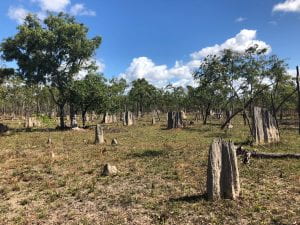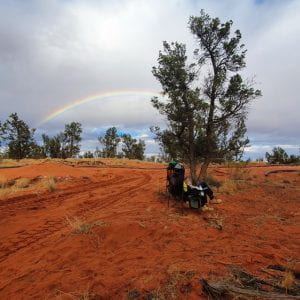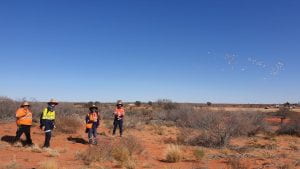Image: Cassie sitting along the banks of the Embley River.
The motivation behind a PhD candidate’s study is often a window into their personal ethos. This is perfectly illustrated by UNE PhD candidate Cassie Schill when she discusses her studies:
“I have a genuine interest in archaeology and cultural heritage, but mostly I enjoy working with people and engaging with different cultures. We can learn a lot by opening a dialogue with people from different walks of life.”

Endless termite mounds on location at Chuulangun, Cape York Peninsula.
Cassie’s PhD brought her to UNE, but she has had quite the impressive learning journey prior to this. Cassie began her studies with a Bachelor of Archaeology from Flinders University and graduated in 2013, followed by her Honours, “looking at people-plant relationships and how plants are socially valued by Aboriginal communities using a case study from western Cape York Peninsula”. Even when she was doing her Honours research the seeds of her PhD can be seen; Cassie described her Honours research as having been aimed at developing “a better understanding of Indigenous worldviews and notions of landscape in heritage assessments of social significance.”
Discussing her learning journey further, Cassie discussed her next big step after her Honours: “Not long after graduating I relocated to the northeast of Thailand where I worked as an English Language teacher. Here, I thrived in an intercultural setting educating Thai High School students in subjects of English, Physical Education, Social Studies and Drama. I stayed within the community of Korat for four years until I was encouraged to return to Australia to pursue a PhD alongside Associate Professor Mick Morrison and Associate Professor Darlene McNaughton working on their ARC Linkage ‘Sugarbag and Shellfish: Indigenous foodways in colonial Cape York Peninsula (QLD)’ project. This journey initially began at Flinders University before I transferred to UNE early in 2020.”

Cassie monitoring groundworks at Olympic Dam, South Australia.
Cassie’s PhD studies are deeply rooted in archaeology, but as mentioned earlier they are also driven by her passion for engaging with other people and cultures.
“My PhD research is focused on Aboriginal landscape use and resource curation in western and north central Cape York Peninsula. I have a particular interest in how plants were used by people across the resource landscape in daily routines and activities, in food production, in ceremony and social organisation, and in the manufacture of domestic toolkits (i.e. fibrecraft, digging sticks).”
“Cross-cultural engagement, coupled with my love of plants and their various uses motivated me to pursue my current field. There is a lot of different ways that plants can be used by people and by looking at how people actively arranged and curated landscapes in ways to increase resource yields, and to maintain access to culturally and economically important food sources is an area that I find incredibly fascinating. Particularly when you take into account the social and cultural protocols that mediate relationships with plants.”
“It has been an enlightening journey learning about how plants are valued by different communities around the world and the implications for research into culture change in Australia.”
Cassie also has further hopes for her research project, noting that it challenges the existing narratives about late-Holocene Aboriginal occupation and shows how people used curative practices across specific cultural landscapes. Providing new academic knowledge in this field is not only a passionate goal of Cassie’s project, but it is a way of representing the complexity of a people and culture in a new light.
Like many researchers whose projects require field work, Cassie counts the complications that have arisen due to the COVID-19 pandemic as one of the main surprises of her PhD thus far.
“Logistically, I have had to be really adaptive due to restrictions travelling interstate and entering remote Aboriginal communities,” said Cassie while discussing how her data collection has been on hold for over a year. “However, I guess the silver lining is that from this I was able to find employment in my field and gain valuable industry experience to hone my skills for my field work. In this sense, it gave me time to feel fully prepared and confident about what I intended to do.”
A true scholar of the archaeological field of study, Cassie expanded upon the experience she was able to gain through the various side projects she has undertaken whilst studying:
“Outside of my PhD I work as an archaeologist and project manager for Australian Heritage Services in South Australia. I recently finished a long-term project working for the Olympic Dam Native

OD NTP Rep Corp representatives and Cassie on survey at Olympic Dam, South Australia.
Title Parties Representative Corporation on a project for BHP. This provided me with good industry experience in commercial archaeology, as well as highlighted a lot of the challenges facing Aboriginal communities particularly in terms of representation and having a clear voice in matters concerning their heritage. I also took part in a recent job working alongside Lantern Heritage to dig test pits for the wild dog fence extension project along the NSW/SA border. This was a great excavation experience and the time spent with the Traditional Owners was incredibly valuable, particularly the transfer of knowledge and skills. At times this kind of work challenges my own ethics but in hindsight these experiences help me to clearly see what kind of archaeologist I would like to be.”
With such passion and dedication for her field of study, Cassie has some fantastic insights for students aspiring to a PhD. Here is Cassie’s advice for her fellow students and researchers:
“It is important to get as much experience as possible and to grasp opportunities when they are right in front of you. I have worked really hard to get to where I am now and a lot of my success I owe to the relationships and friendships that I have built with people along the way. You can’t sacrifice your happiness when doing research and I think what helps is having many things happening outside of its orbit to keep you sane.”



Recent Comments